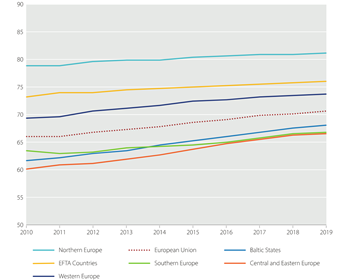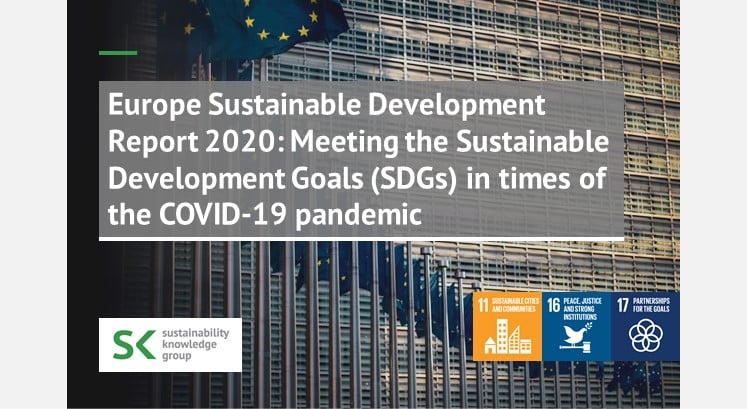The Sustainable Development Solutions Network (SDSN) and the Institute for European Environmental Policy (IEEP) published the Europe Sustainable Development Report 2020 (ESDR), the second independent quantitative report on the European Union’s progress. It is part of the broader Sustainable Development Report (SDR) series that tracks the performance of countries and municipalities around the world on the Sustainable Development Goals (SDGs). The report is based on a peer-reviewed and statistical audit methodology and includes country profiles of the EU, member states, and partner countries.
Performance of European countries against the SDGs
The COVID-19 pandemic represents a serious setback to sustainable development in Europe and around the world. However, even before the pandemic outbreak, no European country was on the right track to achieve all the SDGs by 2030 or the objectives of the Paris Agreement.
The European countries performed poorly on SDG 2 (Zero Hunger), and there were significant performance gaps in SDG 12 (Responsible Consumption and Production), SDG 13 (Climate Action), SDG 14 (Life Below Water) and SDG15 (Life on Land).
COVID-19 has intensified these challenges, particularly in social and economic goals, and has not resolved the climate and biodiversity crises. The most urgent priority for Europe is the suppression of the pandemic, as Europe’s responses to the COVID-19 pandemic have been far less effective. Learning from countries that have successfully suppressed the virus will be essential to achieving the SDG target 3.d on preparedness for global health security issues.
Guido Schmidt-Traub, Executive Director of the SDSN, states that
“The SDGs and the Paris Agreement reflect Europe’s values and are aligned with the European Green Deal, so the EU must provide global leadership on the goals. The EU has the tools in place to achieve the SDGs internally, but they must be organized more clearly around the six transformations. It is in the EU’s interest to promote SDG and Green Deal diplomacy ahead of the climate and biodiversity COPs in 2021.”
Europe faces the biggest SDGs challenges in sustainable agriculture and diets, climate, and biodiversity, and strengthening the convergence of living standards across its countries and regions. Overall, the Nordic countries perform the best in the 2020 Europe SDG Index, with Finland leading followed by Sweden and Denmark.
European countries get the best results on social and economic goals, including SDG 1 (No Poverty), SDG 3 (Good Health and Well-Being) and SDG 6 (Clean Water and Sanitation). There are currently no good international measures to achieve SDG target 3.d on preparedness for global health security issues.
The report’s results are in line with the Eurostat results in its “Sustainable development in the European Union 2020” report. However, an important difference between the two reports is that all European countries perform poorly concerning SDG 2 (Zero Hunger) in the current ESDR.

Six Priority SDG Transformations inside the EU
The report proposes six “SDG Transformations” that align well with the EU’s signature policy initiatives, including the Green Deal. The following six SDG Transformations are important tools for enhancing policy across EU instruments and between member states. These SDG Transformations are expected to help the EU map out an operational strategy to ensure that key synergies and trade-offs are addressed.
- Education, Skills and Innovation: Ensure top quality education, including lifelong learning, for all Europeans, and strengthen innovation in strategic technologies and industries.
- Sustainable Energy: Promote energy efficiency, achieve zero-carbon power generation, decarbonise industry and create new jobs.
- Sustainable Communities, Mobility and Housing: Strengthen cities and other communities by promoting sustainable and smart mobility, renovating housing, ensuring sustainable building standards and supporting new jobs.
- Sustainable Food Production, Healthy Diets, and Biodiversity Protection: Ensure sustainable agriculture and ocean use, promote healthier diets and behaviours, and protect and restore biodiversity and ecosystems with decent incomes for farmers and fishermen.
- Clean and Circular Economy with Zero Pollution: Curb pollution, reduce material consumption, and minimise the environmental impact of European industry and consumers.
- The Digital Transformation: Build cutting-edge digital infrastructure, strengthen innovation, and protect citizen’s rights to their data and European democracy.
The report also identifies six major tools for implementing the SDG Transformations:
- A New European Industrial and Innovation Strategy for the SDGs.
- Financing the SDG strategy.
- Coherent national and EU SDG policies – the SDG-based European Semester.
- Coordinated Green Deal/SDG Diplomacy.
- Business standards and reporting.
- SDG monitoring and reporting framework.
Action and Development Cooperation for the SDGs
Many of the proposed and current EU policies aim to achieve the 2030 Agenda. Although there is no need to launch a new strategic process for the SDGs at the EU level, there is an urgent need to maintain a strong political commitment to the goals, track progress, and report.
The Green Deal has attracted significant international attention, and other countries are keen to partner with European initiatives and experiences in mutual learning and transformation processes. Green Deal/SDG Diplomacy can help achieve sustainable development worldwide and advance the EU’s geopolitical interests.
Photo by Christian Lue on Unsplash

